Text
How to know which language level you’re at and tips for improving your skills - divided by proficiency level!
These are all my personal thoughts and experiences from reaching a proficient level in one language, and an intermediate in another!! Feel free to correct me or add whatever you wish<3
1. A0 - Knowledge Level: Nothing
At this stage, you have absolutely no knowledge or very little knowledge about a language. My advice is to start out slow: the alphabet, pronunciation rules, basic pronouns, colors, etc. At this point, there’s not much you can improve on (Reading/Writing, Listening and Speaking) since you’ve got no actual knowledge to expand upon. Try apps like Duolingo, have fun with translating words such as your favorite animal, plant, or swear word. Don’t put too much pressure on yourself at this point, it’s all in good fun! Try starting a notebook in which you write down new words, (i.e. all of them) or watching a couple videos on Youtube, even if you don’t understand much.
2. A1 - Knowledge Level: Just a Bit
This is when you slowly exit the stage of “is this even a language” and enter the “beginner” world. You know a couple basic verbs (to be, to have, eat, sleep, walk, talk, etc) and some sets of basic nouns/pronouns. (weekdays, months, numbers, colors, objects you find around the house, and all that fun jazz.) You can string together a couple sentences you’ve heard twenty times on Duolingo! Regardless of the fact that “The boys drink milk” is not really something you’ll need in irl conversation, it’s good that you’re getting familiar. By this time, you should start looking into proper grammar rules such as verb terminations, tenses, noun declinations, pronouns, etc. Children’s books are a good way to learn a lot of stuff you’d need. The language is simple and it goes straight to the point, which is the only type of writing you understand, mostly. Right now, speaking is not really an option aside from learning to pronounce words right. Listening, on the other hand, can be done really easily! If you find that Youtube channels in your target language are boring or too hard to understand, music is the way to go. You’re especially lucky if you’re a Disney fan, because most of their songs are easy to remember and are dubbed in a lot of languages, so have fun with finding what fits you best!
3. A2 - Knowledge Level: Basic/Preliminary
Now we’re beginning to see some major improvements. You pick up words easier, you can read almost perfectly even if you don’t understand everything, and you can form really basic sentences by yourself. For speaking, by now you should be able to say your name, the place you live in, and maybe talk about your hobbies or your favorite stuff! It depends on if you’ve worked with a teacher until now or not, so don’t worry if you’re still struggling. As a stepping stone between beginner and intermediate, this level can either be the one when you slowly improve or make a really big jump in your skills. Listening to songs and youtube videos should be easier, but nobody is expecting you to actually comprehend everything. As for vocabulary and reading, learning new words should come more intuitively by now, but again, you’re still in the early days. Writing is still something that can be difficult, so try maybe linking a couple sentences together to make a short story and translating some simple texts. But it you don’t find it difficult, writing a hundred words once a couple days may be the way to go.
4. B1 - Knowledge Level - Intermediate
Finally, we’ve reached the intermediate stage! By now you should be able to hold very basic conversation and reveal information about yourself. You should be able to pick up words you know from the people around you, and understand mostly everything if spoken slowly and clearly to. Reading light books or magazines should be challenging but okay, while you should be able to remember certain words without making too big of an effort. By this stage, active learning is still essential, as you probably have a lot more ahead in your language learning journey. I encourage you to write short stories or several sentences about your day in a diary, depending on what works for you. Watching Youtube videos should be something you do often, because it improves listening skills greatly and gets you accustomed to informal speech patterns and filler words.
5. B2 - Knowledge Level - Advanced Intermediate
Yay! You have officially reached the advanced intermediate stage! You should be able to hold everyday conversation without too big of a headache, listening probably isn’t a breeze for you but still, if you watch a basic youtube video you can pretty much get all of it. YA books should be a regular part of your reading, since they’re not too hard to comprehend but still a good reading exercise. Vocabulary probably isn’t a bother anymore, since you know most of the words you need and the ones you don’t, you hear them once or five times and they stick to you. At this level you can probably write some basic fanfiction, or anything that doesn’t require advanced language skills but is still challenging. Congrats! You’re almost at an advanced level!
6. C1 - Advanced
If you’re still here, means you’ve got a strong sense of dedication. C1 is the advanced level, where you have pretty much everything that you need to comfortably live your life in a country which speaks your target language. If you’re already here and most of the above things seem far, far away to you, then maybe it’s time to get down on some serious reading. Look up local classics, or contemporary works that stimulate your mind. Writing essays, reviews, reports, etc, should be something you are able to do, as you have a good grasp on both formal and informal language, both literary concepts and idioms/phrasal verbs/slang. Listening should come easily, with the ability to understand everything that is spoken to you without worries, as long as they don’t have an alien accent. Speaking, too, should be a breeze by now, with everyday conversation being a piece of cake and more formal conversations not posing too big of a challenge. If you want to reach the next– and last– level, it can be done through thorough preparation of skills that are usually required by exams or for language-related jobs. If you don’t care about either of these, congrats! You learned a language!
7. C2 - Proficient
Long past fluency, you now wish to master a language, down to its very core and history. Pick up some of the big classics to read. Watch a bunch of those complicated videos explaining complicated concepts. Write poetry and prose,and speak to people in contexts which require more than the average range of vocabulary. If you’re still not satisfied, get a damn teacher. Tumblr can’t help you now.
14K notes
·
View notes
Text
I find that keeping some sort of daily log helps decompress. Journaling can also be a creative output!
“i don’t like writing about my day, but i want to keep a journal”:
quotes and copywork. when reading, if you find something you enjoy, just copy it into the notebook. you can copy a whole chapter if you wish, highlighting what caught your attention the most.
definitions. look up on a dictionary and copy it. you could write your own dictionary as well, making up definitions for words.
lists. a classic, write movies to watch, books to read, the playlist of the month or just the groceries you have to buy.
maps. when going somewhere, you could draw the route you took or just a map of the place itself. just look up the place on google maps and copy it. you can draw a little map of all the places you have lived or the schools you have attended as well.
photos
take “notes” as you watch movies / documentaries. write down phrases that caught your attention or doodle.
illustrations and clippings. if you see an image or piece of art that you liked, put it in your journal. if it’s from a book or from a magazine I would recommend scanning it, tho’. it will serve as a record of what kind of art you enjoy through the years.
newspaper clippings from the day.
tickets and pamphlets. from movies, museums, transportation.
postcards
records. you could record for a month what the temperature was when you woke up and when you went to sleep. if you do that for a year, it gives you a better notion of the passing of seasons. you could record rainfall and other seasonal changes as well. you could choose something (an animal, a plant, an item or object) and write down every time you see it.
rubbings of leaves, coins, landmarks.
count. there’s a scene in the movie Coraline (2009) where Coraline’s dad tells her to go count the windows. you could do the same type of counting game if you are bored and write down.
mindmaps/sketchnotes + timelines of books, movies, music albums.
collages
pressed leafs and flowers
your collections. if you collect anything you could write down an inventory or maybe try to draw the items.
recipes. write down recipes and give it a score every time you try it. you could do the same for drinks you try out.
stickers
comic strips. you can find a bunch of it online, glue your favorites in your notebook.
44K notes
·
View notes
Text
Who am I? ✨🖋
I’m Macy! I decided to start this studyblr to track progress and and hold myself accountable for my actions.
I have ADHD and a chronic illness and sometimes the combination of thoes two things can really suck me into a pit, but having something to answer to can be helpful!
Currently I am working on my GED, completely by myself, from a book. Yes, you saw correct. Triditional high schools in the Midwest do not nurture education unless you are rich, in good health, and have no mental hardships. So, I was forced to drop out and make the best of getting a GED. It’s not too bad, my education is in my hands, and I can control how well I prepare myself for the tests.

I don’t often see studyblrs about GEDs, and I don’t know if it’s because it’s not like traditional school, or if people are ashamed. There’s not need to be ashamed though, it’s the equivalent in most states! Do what works best for you!
My studyblr will focous on the GED, the subjects, and how I’m preparing to take the very expensive tests and complete them with honors.
Some personal information, I’m 20, I live with my partner of three years, and he’s the most caring supportive person! I have four adorable, energetic fur babies named Ronan, Chi-Chi, Kane, and Isabella! I started working on my GED to fulfill my dream of getting a degree as Medical Laboratory Tech and eventually a mortuary science degree, we’ll see along the way. I’m a positive and motivated person, but often times my clinical depression and ADHD feed off each other and can put me down for a little while. I have Fybromyalgia, rheumatoid Arthritis , IBS, and Raynaud’s disease, thoes things too tend to put me in a bit of pain and in a rut, but all I can do it keep moving forward!
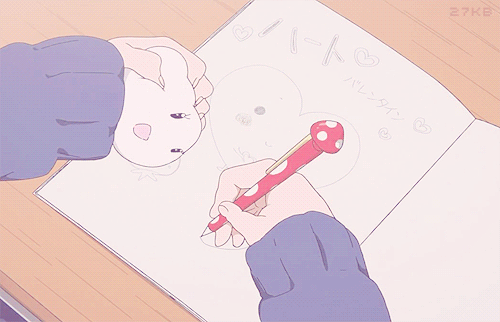
I look forward to using my studyblr as a way to be accountable as well as track my positive times and hardships. One day, every single ounce of effort it takes me to do this is going to be worth it over and over again.

Short Term Goals:
Build Credit
Finish GED
Establish Stable Work
Save money.
Long Term Goals:
Get Batchelor Degree as a Medical Lab Tech
Go to Mortuary Science School
Buy my own home
Get married
Have a family
Save money for the further future
Enjoy some music...

#studyblr#dogsarefamily#studyspo#study hard#studygram#high school#study blog#accountable#introducing myself#introductory#math stuff#launguage#future doctor#future#positivity#happiness#moving on#starting new#spoonie#fybromyalgia#adhd brain#adhd stuff#adult adhd#Spotify
29 notes
·
View notes
Photo

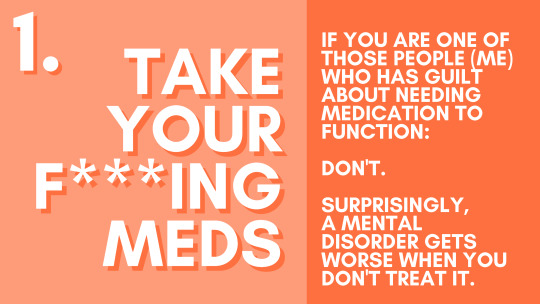
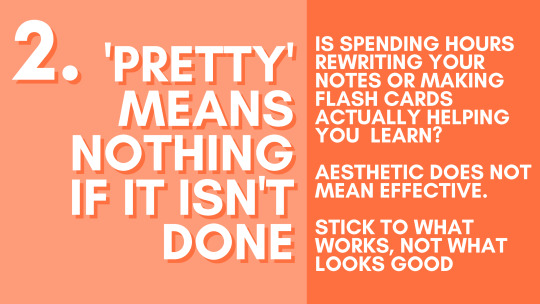
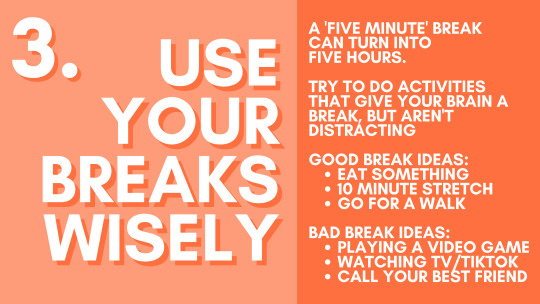
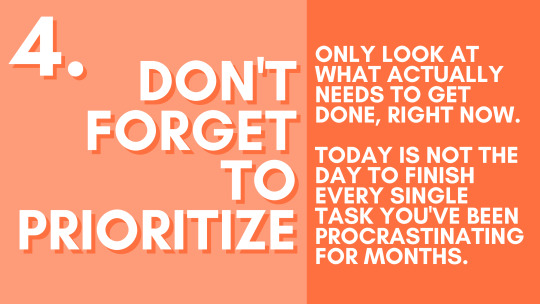
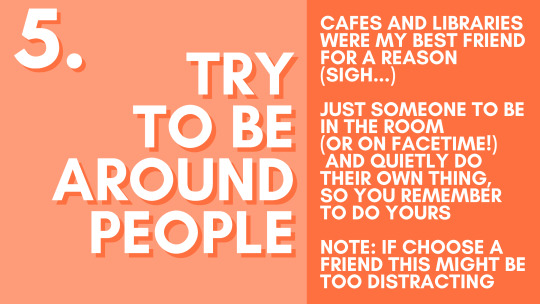
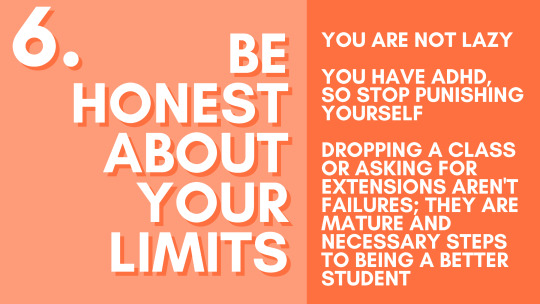
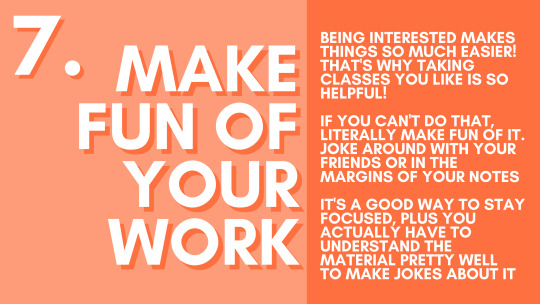

some people were asking for a actual and i can never pass up an opportunity to procrastinate so here’s just a couple of things i always need to remind myself of…now back to my paper :(
34K notes
·
View notes
Text
Words to describe someone’s voice :
adenoidal (adj) : some of the sound seems to come through their nose.
appealing (adj): voice shows that you want help, approval, or agreement.
breathy (adj): with loud breathing noises.
booming (adj): very loud and attention-getting.
brittle (adj): if you speak in a brittle voice, you sound as if you are about to cry.
croaky (adj): they speak in a low, rough voice that sounds as if they have a sore throat.
grating (adj): a grating voice, laugh, or sound is unpleasant and annoying.
gravelly (adj): a gravelly voice sounds low and rough.
high-pitched (adj): true to its name, a high-pitched voice or sound is very high.
honeyed (adj): honeyed words or a honeyed voice sound very nice, but you cannot trust the person who is speaking.
matter-of-fact (adj): usually used if the person speaking knows what they are talking about (or absolutely think they know what they are talking about).
penetrating (adj): a penetrating voice is so high or loud that it makes you slightly uncomfortable.
raucous (adj): a raucous voice or noise is loud and sounds rough.
rough (adj): a rough voice is not soft and is unpleasant to listen to.
shrill (adj): a shrill voice is very loud, high, and unpleasant.
silvery (adj): this voice is clear, light, and pleasant.
stentorian (adj): a stentorian voice sounds very loud and severe.
strangled (adj): a strangled sound is one that someone stops before they finish making it.
strident (adj): this voice is loud and unpleasant.
thick (adj): if your voice is thick with an emotion, it sounds less clear than usual because of the emotion.
tight (adj): shows that you are nervous or annoyed.
toneless (adj): does not express any emotion.
wheezy (adj): a wheezy noise sounds as if it is made by someone who has difficulty breathing.
29K notes
·
View notes